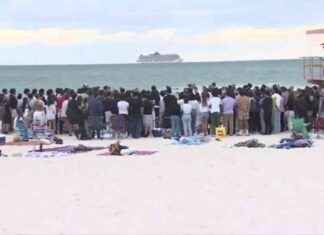The Marmán family fled Argentina in 1981. As Jews, they chose Israel to get away from the kidnappings, torture and disappearances of the generals’ dictatorship. Since then, Clara Marmán, a 63-year-old teacher, lives in the Nir-Yitzhak kibbutz, on the Israeli border with Gaza. On October 7, she was kidnapped by Hamas in the incursion of the operation that has unleashed terror in the region and that shields Israel’s brutal retaliation against the Gazan population. “The important thing is that the kidnapped return and then peace must prevail.”
Clara defines herself as a pacifist. “The kibbutz is less than four kilometers away from the border, and over the last twenty years I have gotten used to missiles and alerts.” All the kibbutz houses have a panic room, which they call a safe room, as if they lived in a hurricane zone.
“It was my two-year-old niece’s birthday and I invited the whole family, which is spread all over Israel. The kibbutz is a country thing, it’s pleasant and I like, as a hostess, to receive visitors”. With his partner, Luis, 70, invited his brother Fernando and his sister Gabriela to spend the weekend. “At 06.30 I heard the alarm and woke everyone up. I told them that it was necessary to enter the security room”.
Clara Marmán is used to these alarms. They are usually locked in for a few minutes, hear the missiles and come out to continue their routine. “I turned on the television and saw that the alert was for the whole country, a terrible attack.” On Israeli television they began to see cities where there were trucks with terrorists and shootings. Marmán is a hostess who likes to serve her guests. “As Argentinians we like mate, so I brought them mate and cake, but I started to see that the closure was getting much longer”. Then the concern grew and they began to receive messages from worried relatives and neighbors or acquaintances asking them not to leave the room. Clara explains that it was not the first time that Palestinians had infiltrated the area, but that usually the incursions are purely material, people looking for work. During the years that the Argentine family has lived next to the border with Gaza, “there has been coexistence with the Palestinians”, many of them, in fact, work in the fields of the kibbutzim, although Clara admits that the coexistence and the permeability of the border in both directions have been tightening and reducing. “We are pacifists and we believe in mutual coexistence”, so Marmán continued without assessing a terrorist incursion. “I’ve been in my house for over forty years and I feel safe there. There is also the army at the border looking after us and the kibbutz guard. I never thought anything like this could happen.”
“Around 11:00 a.m., we started hearing noises inside the house.” They had been locked up for five hours when things took a turn for the worse, hearing windows being smashed, furniture being fired at and the house being trashed. “This was the last thing we could explain in the messages we sent to family and friends.”
The kibbutz’s safe rooms are designed for missile attacks, the most common threat in the area, so they are reinforced with concrete but the doors are not particularly robust, as they must be able to be opened by rescue teams if there is no attack The Marmans tried to block the door, with metal rods and a chair, but it didn’t take long for the Hamas terrorists to break it down.
“Instinctively we placed ourselves in an opposite corner of the security room.” This saved their lives, because when they forced the door a volley of shots entered the room. “We said: ‘Don’t shoot, don’t shoot!’, we were terrified”. The hostess tried to reassure the relatives: “Well, don’t worry, we’ll do what they say.” The Marmáns were lucky, explains Clara, to be transferred to their captivity all together. When, in the November negotiations, Hamas decided to release women and girls, Clara, her niece and her granddaughter did not want to leave: “We will all leave together.” Fernando and Luis, his partner and his brother, obliged them.
Clara only thinks about freeing them both, and even though her house has been destroyed and the brutal violence unleashed by Israel against the Gazans has changed the scale of the conflict, she still believes in coexistence. “When I arrived in Israel from Argentina, in 1981, I went to the beaches of Rafia”, the modern Rafah. “Then there was still good coexistence between Palestinians and Jews, but over the years absolutely everything was ruined.” Despite this, he still advocates for a truce today. “You have to find a way. I am a pacifist, I believe in humanity, beyond religions or races, and even after 53 days of kidnapping, I still think that a truce can be negotiated.”
With the rest of those released, they work for dialogue: “There are open channels. We ask that the Government listen to us and understand that human life is the most important thing”.








